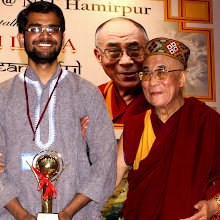Feb 3, 2009
One of the most enthralling part of my college life uptil now has been my time with ISTE..It has been one such platform which has made me realise the importance of team dyanamics.the various forms of literature that i have carefully analysed has led tofollowing conclusions as to what should be the ingredients of a succesful team..This article would not have been possible without the unending coopoeration from my colleagues at ISTE.
Have you ever noticed how some teams have the magic touch? You see their work, and the way they work together and all you can think is, "Oh, I wish I were on that team instead of this one." It's hard to put your finger on what exactly makes them tick, isn't it?
Well, satisfy your curiosity right here and right now. I have the answer.The reason you can't see the magic is that it's invisible. It's not written down in their mission statement and it's not repeated in the footers of their documents.From outside the team, you can't see it at all.
Here are the five hidden secrets that separate the great teams from all the rest:
1. Trust. The team has developed a high level of trust. This means not only personal trust ("I trust that you are fundamentally a good person who won't stab me in the back") but also competency trust ("I trust that you have the knowledge and abilities to come through for me"). This level of trust takes time and while it may appear to be there from the start, it's not.
2. Conflict. Team members are willing to deal with conflict in a direct, honest, and thoughtful way: not holding things in, not lashing out, and never using conflict for personal gain.
3. Feedback. Team members are willing to call each other on unhelpful, unproductive, or destructive behaviors. They don't chicken out when it comes to giving and receiving feedback at the peer level.
4. Commitment. Most team members are committed to success, even when going through difficult times. They will walk the talk, as the saying goes, no matter how challenging the situation.
5. Values. The team has a clear sense of their shared values. They do not necessarily share all of the same values, but they do share several core values, which guide their decision-making and behavior.
How does your team stack up? If you're not close to a 10 on a scale of 1 to 10 in all five areas, fix it. If it's beyond repair and the leader is unwilling to face this, think about finding yourself another team. Life is too short to be miserable at work. Low performing teams are miserable teams. High performing teams are happy teams. How would you rather feel all day?

5 comments:
well, i m proud that i was in ur team shanty.. nd above all i was missing the 2nd tip.. (conflit- i always have conflicts), bt after reading this i'll work on this. thanks to u again..
m sory m nt dat good in commenting.. dnt feel bad..
well, m proud i was in your team. nd above all, i was bad in the 2nd para i.e of conflict( i always have conflicts in the team) bt now i will try nd overcome it..
thanks for ur help again.. nd m sory m nt so good in commenting..
i am in right team boss!!
proud to be a member of such great team!!
the most important part of being a team is not only to see the positive sides, but not to neglect the negative aspects...
being in any team helps; it helps your friends more..(leak the papers, whenever possible:))
i am happy to read such a view expressed by you.. but your writing does not reflect upon what you have learnt. it stresses more on team dynamics. how about a bit more insight on you and your team ISTE?
Post a Comment